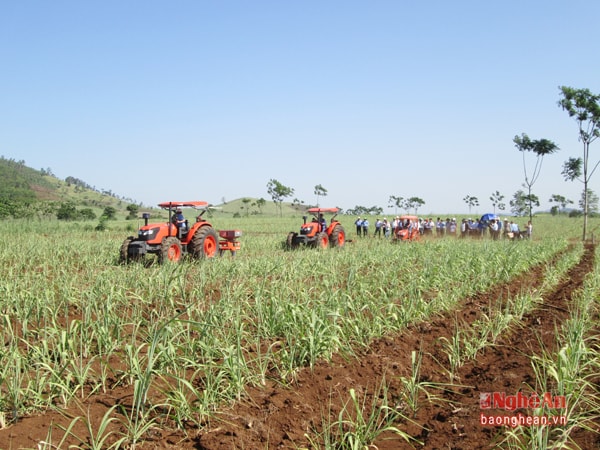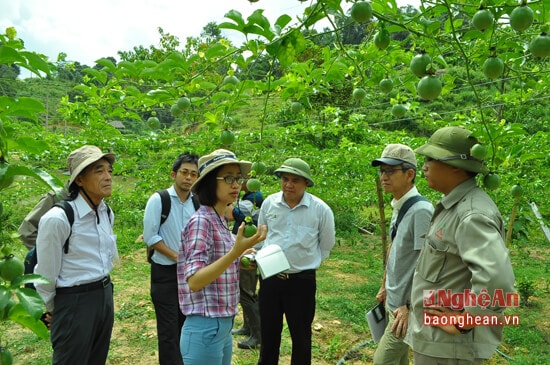Orientation of 'high-tech agricultural highway' in Western Nghe An
(Baonghean) - Editor's note: Nghe An Newspaper quotes the content of the speeches of delegates attending the Workshop "Developing Nghe An to 2020 in the spirit of Resolution 26 - NQ/TW of the Politburo".
…First of all, it is necessary to determine the general orientation of developing agriculture in Western Nghe An into an agricultural development area based on the development of high-tech agricultural zones and regions (HDA) towards export and participation in the global agricultural value chain. Connect with Thanh Hoa province to form a “high-tech agricultural highway” with Ho Chi Minh road as the main axis.
 |
| Sugarcane plantation in Nghia Dan. Photo archive |
Specifically, it is necessary to plan the development of the West into two development zones with appropriate policy mechanisms:
Mountainous areas:(including 5 districts of Ky Son, Que Phong, Tuong Duong, Quy Chau, Con Cuong): focus on developing agriculture towards exploiting the potential advantages of sub-climatic zones, specialty seedlings, medicinal herbs, long-term industrial crops, livestock farming associated with forestry economy and wood processing industry.
Lowland and midland mountainous areas:(including 6 districts and towns of Nghia Dan, Quy Hop, Tan Ky, Anh Son, Thanh Chuong, Thai Hoa): focus on developing high-tech agriculture and large-scale production.
…Regarding the production organization model, it is necessary to establish agricultural zones and regions applying high-tech agriculture associated with R&D centers of universities, research institutes, and enterprises to accelerate high-tech agriculture. In particular, calling for enterprises to invest in Phu Quy High-tech Agriculture Zone (requesting the Government and the Ministry of Agriculture and Rural Development to allow earlier implementation of the Prime Minister's Decision approving the planning of agricultural zones applying high-tech agriculture - which has brought Nghe An into the period after 2020).
Propose to supplement the planning and encourage enterprises to invest in the Agricultural Zone of High-tech Agriculture in Pu Khang (Quy Hop - area of 200 hectares); Urgently plan the Agricultural Zones of High-tech Agriculture to have a mechanism to support investment and encourage development, including: Passion fruit (Que Phong), orange (Quy Hop, Nghia Dan, ...), tea (Anh Son, Thanh Chuong), sugarcane (Nghia Dan, Quy Hop, Tan Ky ...), medicinal herbs (Ky Son, Que Phong, Con Cuong, ...), tropical fruit trees (avocado, dragon fruit), high-class vegetables and flowers (Que Phong ...), ...
Attract and form large-scale farming, livestock and forestry enterprises connecting the value chain with processing and farmers. Strongly restructure the agricultural and forestry system to liberate natural resources; Promote restructuring of methods and models of small-scale production to concentrated production such as farms and specialized cooperatives; Prioritize and support infrastructure in key production areas, key industries with high economic value, capable of creating breakthroughs and spreading.
 |
| Japanese Jica delegation surveyed passion fruit growing area in Que Phong |
Regarding basic solutions, in addition to specific solutions to effectively mobilize land resources and develop agricultural enterprises, it is necessary to increase the application of science and technology, including accelerating the establishment of the CNC Agricultural Zone in Phu Quy to attract institutes and schools to build research, testing and high-tech application zones.
Ensure connectivity, especially between the State, scientists, producers (farmers and agricultural enterprises) with mechanisms to promote the search for agricultural development needs, remove difficulties through scientific and technological activities, improve production to increase output, quality and brand.
At the same time, connect with distributors and banks to expand capital and production scale. Strengthen the linkage and agricultural development mechanism between the highlands and midlands, including the application of science and technology development and large-scale production, processing and consumption in the midlands, while continuing to support the development of household, farm and ranch economies in the highlands.
Allocate 50% of financial resources for scientific and technological activities in the agricultural sector. Prioritize enterprises investing in agriculture through supporting the implementation of scientific and technological tasks and impacting the production chain from the seed stage to brand building and trade. Impact to develop scientific and technological enterprises. Link technology application with business incubation. In the immediate future, focus on impacting the production chain of orange trees, beef cattle, medicinal herbs, tea, sugarcane, passion fruit, specialty seedlings, etc.;
Accelerate the Intellectual Property Program to establish, exploit and develop brands of key agricultural products and specialty agricultural products bearing the name of Nghe An; Implement the Program to preserve and develop gene pools with the most important purpose of discovering rare species to call for investment from businesses associated with the application of science and technology to develop products; Support and encourage businesses to invest in R&D research centers in the Western region (such as TH Milk Joint Stock Company has established a dairy cow research institute, a sugarcane research center) through the program to support the development of science and technology organizations and place orders to carry out science and technology tasks at the provincial and ministerial levels.
Regarding policy mechanisms: Review and adjust the system of policies to support rural agricultural development in the direction of comprehensive support for development along the production chain of some key subjects and specialty seedlings (integrating resources); Focusing priority resources on developing the application of science and technology in agriculture.
Building policies to support the development of agricultural production forces in the area: For cooperative economy, cooperatives and household economy, continue to review and arrange to convert the old cooperative model to a new model with support mechanisms so that cooperatives can better fulfill their role in supporting household economy and input services, controlling quality and output service focal points, especially specific support mechanisms for land, capital, training of management human resources, technical staff and technical services, supporting the application of quality standards (GAP, GlobalGAP, GACP...), building and developing brands, certifying safe products,...
Encourage agricultural enterprises to participate in shares in cooperatives. For farm economy, support and promote the corporatization of farm economic sector on the basis of supporting land legality, promoting large-scale production, linking production, product consumption, building product brands and training management and techniques. For agricultural enterprises, prioritize resources to implement policies to encourage high-tech application, policies to attract enterprises to invest in agriculture that are currently of the Government and the province, integrating support through encouraging enterprises to directly implement projects to apply science and technology (science and technology career funds). There is a mechanism to grant land to enterprises to lease from 10 - 30% of the planned area to develop key seedlings.
On agricultural trade development:Implementing Decision 964/QDTTg dated June 30, 2015 of the Government on developing trade in mountainous areas in the direction of prioritizing the consumption of agricultural products and food and supplying materials and input materials for agriculture; Strengthening trade promotion, building and promoting Nghe An agricultural product brands through information channels and fairs, focusing on the Japanese, American and Russian markets. Having policies to support businesses in trade promotion; Linking agricultural product trade with eco-tourism, craft village tourism, green agricultural tourism, etc.
Tran Quoc Thanh - Director of Nghe An Department of Science and Technology;
Phan Quoc Khanh - BIDV Research Center
| RELATED NEWS |
|---|
